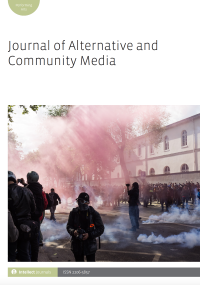Journal of Alternative & Community Media - Current Issue
Volume 7, Issue 2, 2023
- Editorial
-
- Articles
-
-
-
Far-right virtual communities: Exploring users and uses of far-right pages on social media
More LessThe role of social media in facilitating far-right networks and propagating far-right narratives is increasingly documented. However, research tends to focus on far-right pages on social media, thus leaving the users of these pages understudied. Relying on interviews with users of the Facebook page of the radical right organization La Meute in Canada, this study investigates individuals’ motivations and practices when using far-right pages on social media, as well as the interplay between their use of these pages and their view of themselves and society. It shows that users of La Meute’s Facebook page perceive (to varying degrees) that mainstream media are biased and do not represent their views nor address their concerns about immigration issues. As such, they seek meaning by using far-right pages on social media, either as their main source of information or to complement mainstream media. On these pages, they encounter a virtual community of like-minded people, which is conceived in opposition to the rest of society who would not be critical enough of mainstream media and immigration. Boundaries delineating the virtual community tend to be particularly pronounced among individuals who use far-right pages on social media as their main source of information.
-
-
-
-
Local media in transitional fragile states: The cases of Iraq and Libya
More LessAuthors: Carola Richter, Anja Wollenberg and Reda FhelboomLocal media that cater to their local communities are still rare in Arab countries due to government control and centralization of media production. In some transitional states, however, we observe a mushrooming of new local small media initiatives after regulation modes have changed. Yet, these media operate in often fragile states in which a sustainable development of autonomous media is difficult to achieve. In this study, we investigate how local media in Iraq and Libya unfolded and developed over the past decade(s) after regime change. We map the status quo and compare the proliferation of small local media in both countries against the backdrop of media capture and flawed media regulation – patterns that are typical for transitional states.
-
-
-
Hashtag activism: An alternative pathway for the transnationalization of protests a case study of #SaveSheikhJarrah
More LessDigital media have provided activists with communication and organizational tools that have revolutionized the work of social movements. This article contributes to the literature on the role of digital media in the transnationalization of protests by examining a case study of a digital advocacy campaign initiated by Palestinian activists against the Israeli occupation using #SaveSheikhJarrah. It presents an empirical case in which digital media provide an alternative pathway for transnationalizing a local cause through applying the connective action framework. It argues that the Sheikh Jarrah activists successfully used connective action mechanisms through digital media techniques to transnationalize protests that began in East Jerusalem and spread beyond national borders to numerous locations worldwide. Moreover, the study employs a mixed-method analysis that incorporates the network perspective to explain the flow of information and the activists’ roles and relations, in addition to using topic modelling to explain the counterpublic’s narrative building mechanism.
-
-
-
Strings attached: Sustainability and dependence in five models of local and community media
More LessBy Franz KrügerSustainability is a key issue for local and community media in the Global South as well as the Global North, albeit in different ways. After identifying significant gaps in the sustainability literature, the article presents and discusses a taxonomy of ‘models’ – the relationships that arise around different dominant sources of revenue: commercial, patronage, state, donor and community. Although the models operate in all contexts, particular dynamics develop in situations of poverty and marginalization. Drawing mainly on literature from Africa and other parts of the Global South, it is argued that a broadly political economy approach surfaces issues of power and dependency in each model. The models serve as analytical tools that enable better understanding of the vulnerabilities of media for marginalized communities, where a lack of alternatives gives them disproportionately greater importance. Important new areas of research into issues of power in local and community media are suggested, including ways to reduce the vulnerabilities identified.
-
-
-
YouTube vlogging and dissidence in Zimbabwe: Opportunities from authoritarian media policies
More LessAuthors: Wishes Tendayi Mututwa and Gift GwindingweThis article explores the use of YouTube in the increasing practice of vlogging in Zimbabwe. Vlogging counters authoritarian media policies that restrict the entry of new media players and democratic participation in existing traditional media. This dearth of public debate on traditional media has created a window of opportunities for social media as alternative voices through YouTube ‘televisions’. We consider this a metaphorical yearning for alternative television stations in the mainstream media-dominated context of Zimbabwe. Employing the theoretical concept of counterpublics, this article presents a thematic analysis from three selected YouTube channels: Bustop TV, Goldgator TV and TV 7. The findings reveal that although authoritarian media laws are a huge setback to freedom of expression, YouTube empowers non-professional journalists to challenge those who possess political power. The article establishes that authoritarian media laws are no longer as effective in stifling dissent. We argue new thinking towards a liberal trajectory is called upon.
-
Most Read This Month Most Read RSS feed


